Search
Search for "click":
(Click here to search this entire website for "click" with Google.)
 |

|
|
3G-EA click is a versatile cellular network communication solution, featuring the compact 3G UMTS/HSPA Quectel UG95 module. This module features a full set of options for the cellular networking and communication, such as the network indication, embedded TCP/UDP stack, HTTP/HTTPS stack, full GSM/GPRS/EDGE implementation, UMTS/HSDPA/HSUPA protocol implementation and more. 3G-EA click features data-rates of 7.2 Mb/s (downlink) and 5.76 Mb/s (uplink) in HSPA mode. Onboard 16bit audio CODEC IC adds high-quality voice communication capability.
|
|
|
|
 |
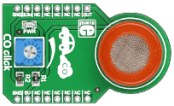
|
|
CO click carries an MQ-7 sensor for Carbon monoxide. The gas sensing layer on the sensor unit is made of Tin dioxide (SnO2), which has lower conductivity in clean air. The conductivity increases as the levels of Carbon monoxide rise. The detection range of the sensor is 20ppm-2000ppm of CO. To calibrate the sensor for the environment you’ll be using it in, CO click has a small potentiometer that allows you to adjust the Load Resistance of the sensor circuit. For precise calibration the sensor needs to preheat (once powered up, it takes 48h to reach the right temperature). CO click communicates with the target board through AN (OUT) mikroBUS line. The board is designed to use a 5V power supply only. |
|
|
|
 |

|
|
FM Click features the Si4703 IC, and is a complete FM radio tuner in the form of an add-on board. It supports worldwide FM band (76 - 108 MHz). The board contains two LM4864 audio amplifiers as well. The Si4703 has a nice set of features; such as automatic frequency and gain control, RDS/RBDS processor, seek tuning and volume control. FM antenna is provided through the earphones cable (recommended length between 1.1 and 1.45 m), which is plugged into on-board 3,5mm audio connector. FM Click has a simple I2C interface. All these features make this board ideal for MP3 players, portable radios, PDAs, notebook PCs, portable navigations and many more. The board is designed to use a 3.3V power supply only. |
|
|
|
 |
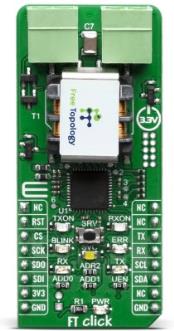
|
|
FT Click is a compact smart transceiver add-on board that helps you add a Free Topology (FT) interface to any host board with the mikroBUS™ socket. Leveraging FT, the most reliable and easiest-to-scale wired communications media, FT Click lets you network sensors and devices to create IoT solutions for automation and control networks that are easier to develop, integrate and install. This Click board™ supports full communication stacks for LON® and BACnet FT, as well as FTMQ (MQTT like messaging format) on board to simplify integration of BACnet, LON or custom IoT networks over twisted pair wire. FT Click is ideal for markets including smart buildings, cities, machines, agriculture, manufacturing, transportation and many more where wireless communications do not provide the required reliability and scale.
|
|
|
|
 |
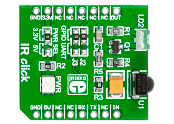
|
|
IR Click is an add-on board in the mikroBUS form factor. It is a compact and easy solution for adding an infrared (IR) remote control module to your design. It features the TSOP38338 IR receiver module as well as a QEE113 IR emitting diode. The 38 kHz receiver carrier frequency is recommended for RCMM, NEC, RC5, RC6, r-step and XMP codes. IR Click communicates with the target microcontroller via mikroBUS UART (Tx and Rx) or AN and PWM lines. Jumpers J2 and J3 allow you to choose between the two options. An SMD jumper is used to select between 3.3V or 5V power supply (soldered in 3.3V position by default). |
|
|
|
 |

|
|
Design devices that warn you of excesive ultraviolet radiation levels with UV click. This click boards carries the ML8511 IC that is sensitive to UV-A (365-315 nm) and UV-B (315-280 nm) rays. The board can output either analog or digital signals proportional to the amount of UV exposure. To bypass the onboard MCP3201 ADC and get an analog output, solder the A/D SEL jumper in the AN position. Depending on the position of the jumper, UV click communicates with the target board either through mikroBUS SPI (CS, SCK, MISO) or AN lines; additionally, the sensor can be enabled or disabled from the MCU through the RST (EN) pin. When handling UV click, be careful not to press or rub the sensitive surface of the ML8511 sensor IC. UV click uses a 3.3V power supply only. |
|
|
|
 |

|
|
8x8 R Click is an add-on board in the mikroBUS form factor. It's a compact and easy solution for adding an 8x8 LED matrix display to your design. It features the MAX7219 8-digit LED display driver module as well as 64 LED diodes. 8x8 Click communicates with the target microcontroller via four SPI lines (DIN, DOUT, CLK and CS). The board is designed to be powered by 5V, but can also communicate with 3.3V MCUs. |
|
|
|
 |
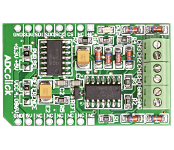
|
|
ADC Click is an accessory board in mikroBus form factor. It includes a 12-bit Analog-to-Digital Converter (ADC) MCP3204 that features 50k samples/second, 4 input channels and low-power consumption (500nA typical standby, 2uA max). Board uses industry standard SPI communication interface. It is small in size and features convenient screw terminals for easier connections. Board is set to use 3.3V power supply by default. Place PWR SEL SMD jumper to 5V position if used with 5V systems. |
|
|
|
 |

|
|
The BEE Click is an accessory board in the mikroBus form factor. It features the MRF24J40MA 2.4 GHz IEEE 802.15.4 radio transceiver module. The module includes an integrated PCB antenna and matching circuitry and communicates with the microcontroller via a SPI interface. This module is an ideal solution for wireless networks, smart home automation, building automation and other electronic applications that need wireless communication. The board is designed to use a 3.3V power supply only. |
|
|
|
 |
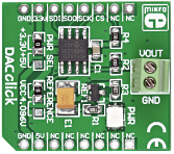
|
|
The DAC Click board is an accessory board in mikroBus form factor. It includes the MCP4921 12-bit Digital-to-Analog Converter which features a SPI interface and optional dual-buffered output. The board provides high accuracy and low noise performance for industrial applications where calibration or compensation of signals, such as temperature, pressure and humidity, are required. The board is set to use the 3.3V mikroBus power supply by default, however soldering the PWR SEL SMD jumper to the 5V position will allow it to be used with 5V mikroBus systems. |
|
|
|
 |
|
Next >
|
|

